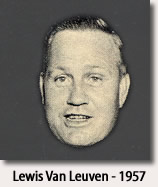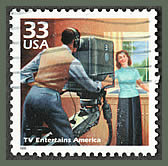Profiles

For those of you who knew him, I want to tell a story
about Lewis Van Leuven. Several years he accompanied me,
Bill Cook, Floyd Grass, Ed Wade, Virgil Torrence and Bryan
Yandle on an annual trip to the wilds of northern Maine
to camp in the snow and hunt deer, bear and grouse (of
course what we saw most was moose, which we could not shoot).
Many times I tried to get Van to tell me about how he lost
his legs in World War Two. Finally on one trip, in the
middle of the night I was driving and Van was awake riding
shotgun and he told me.
 Van was a paratrooper
who dropped behind the German lines on D-Day. He was
in his early 20’s
and stood 6 feet four inches. He was from
Utah and
loved to hunt and ride horses. On the sixth day after the Normandy invasion
his unit was engaged in a firefight with German soldiers
when a German hand grenade landed near him. Before he had
time to do anything it exploded. He was knocked unconscious.
When he awoke he saw that both his legs were badly mangled,
and he was in great pain. The Germans were overrunning
their position. Van said he saw a young German soldier
approach and stand over him. Then the German soldier fixed
his bayonet on the end of his rifle and aimed it right
at Van’s heart. But when the soldier made his thrust
he (the soldier) turned his head and only stuck Lewis
in the shoulder. The German ran off without looking at
Van again.
Van was a paratrooper
who dropped behind the German lines on D-Day. He was
in his early 20’s
and stood 6 feet four inches. He was from
Utah and
loved to hunt and ride horses. On the sixth day after the Normandy invasion
his unit was engaged in a firefight with German soldiers
when a German hand grenade landed near him. Before he had
time to do anything it exploded. He was knocked unconscious.
When he awoke he saw that both his legs were badly mangled,
and he was in great pain. The Germans were overrunning
their position. Van said he saw a young German soldier
approach and stand over him. Then the German soldier fixed
his bayonet on the end of his rifle and aimed it right
at Van’s heart. But when the soldier made his thrust
he (the soldier) turned his head and only stuck Lewis
in the shoulder. The German ran off without looking at
Van again.
Van said he knew the German soldier saw
the condition of his legs and just wanted to put him out
of his misery. But he could not stand to watch as he finished
off the killing job. Van passed out again and when he awoke
he was in a field hospital. Both his legs had been amputated
above his knees, but Van said the really strange thing
was he could still feel his toes itching. But he had no
toes.
Van was eventually
flown back to the States and was fitted with artificial
legs and feet. But ever so often the scar tissue would
build up on his “stumps”,
then begin cracking and bleeding and he would have to go
to a Veteran’s hospital to have that scar tissue
cut away. With each visit he got a little shorter. As he
told it that night, “Once I was six feet four. Now
I am about five-ten.”
One night in
Maine we
were gathered under the fire cover, hugging some heat because
it was about 10 degrees. A trapper drove into camp and
wanted to know if we had seen any beaver ponds, or lynx,
or fisher where he could set his traps. There was a big
snow on the ground.
Van’s artificial legs had a pair
of ordinary black slippers built onto them at the feet.
After the trapper had been there a while, and most if not
all of us had noticed him looking at Van’s feet,
Van left and went into the cook tent. When Van had gone
the trapper said, “Now guys it ain’t any of
my business, but I think you all should take up a collection
and buy that guy a pair of decent, warm boots.”
Just for the record,
we called Van “Twinkle
Toes.” And he loved it.
Thank God for men like him. Otherwise
we would all be speaking German today and seriously or
not declaring Adolph Hitler a hero.
Sleep in peace, Twinkle Toes. You left
the world a better place



 Van was a paratrooper
who dropped behind the German lines on D-Day. He was
in his early 20’s
and stood 6 feet four inches. He was from
Utah and
loved to hunt and ride horses. On the sixth day after the Normandy invasion
his unit was engaged in a firefight with German soldiers
when a German hand grenade landed near him. Before he had
time to do anything it exploded. He was knocked unconscious.
When he awoke he saw that both his legs were badly mangled,
and he was in great pain. The Germans were overrunning
their position. Van said he saw a young German soldier
approach and stand over him. Then the German soldier fixed
his bayonet on the end of his rifle and aimed it right
at Van’s heart. But when the soldier made his thrust
he (the soldier) turned his head and only stuck Lewis
in the shoulder. The German ran off without looking at
Van again.
Van was a paratrooper
who dropped behind the German lines on D-Day. He was
in his early 20’s
and stood 6 feet four inches. He was from
Utah and
loved to hunt and ride horses. On the sixth day after the Normandy invasion
his unit was engaged in a firefight with German soldiers
when a German hand grenade landed near him. Before he had
time to do anything it exploded. He was knocked unconscious.
When he awoke he saw that both his legs were badly mangled,
and he was in great pain. The Germans were overrunning
their position. Van said he saw a young German soldier
approach and stand over him. Then the German soldier fixed
his bayonet on the end of his rifle and aimed it right
at Van’s heart. But when the soldier made his thrust
he (the soldier) turned his head and only stuck Lewis
in the shoulder. The German ran off without looking at
Van again.